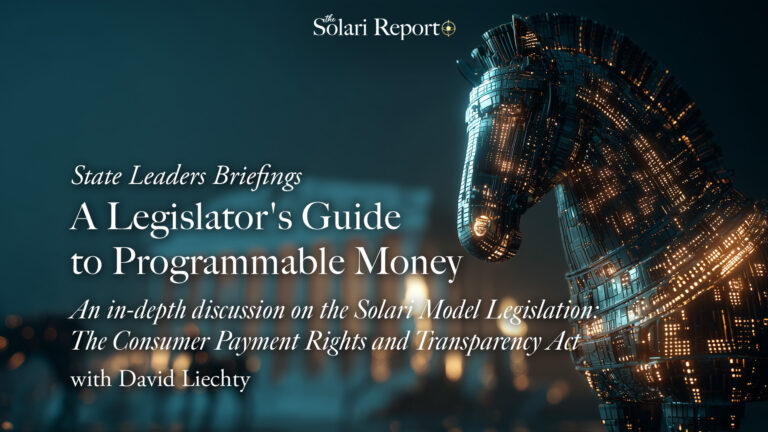WITH CATHERINE AND JOHN TITUS
Theme: They’re Coming For Your Kids
Interview: EMF Solutions with Jared Scholten
Listen to Ask Catherine
Please login to see stories, charts, and subscriber-only content.Not a subscriber yet? You are invited to join here!





















































































































Just finished watching the John Titus presentation to the FOURTH SYMPOSIUM of Doctors for Covid Ethics “Unpacking & Defeating the Medical Tactics of a World Takeover”.
Wow – one of his best ever – many thanks John
https://rumble.com/v18osdt-john-titus-two-weeks-to-flatten-your-countrythe-original-playbook.html
I didn’t know that John Titus trained and practised as an Electrical Engineer.
Here is a another resource to help bring this tyranny to an end. Be sure to take a look at the link to “The Real Story” that outlines the felonious actions of a criminal organization and its flagrant attempt to extort and obtain control over the global population. The evidence is outlined in the “Executive Summary of Litigation” link.
“It’s time we demand our elected state officials appoint special prosecutors to investigate criminal behavior by our elected and appointed officials.”
-Dr. David Martin
https://prosecutenow.com/
Everyone should know that if they are called to grand jury duty, the grand jury can go off and do all sorts of things having nothing to do with the case at hand. At least that’s what I’ve been led to believe.
Thank you Catherine for turning me on to John Titus. I found his YouTube channel and listen to everything he says. What a truthful and honest and decent man! I adore John as much as I adore you!
You have impacted my life in ways I cannot express. I will be 70 years old in September of this year and intend on going back to a technical school to become an esthetician in August. A lifelong dream! Thank you Catherine!
Deborah, That sounds so exciting! Wishing you a wonderful school year ahead! -Jennifer
Thanks so much for your explanation of the golf world’s coup d’etat Catherine! It occurred to me that bigger than the ballistic missiles, bombs and possibly nukes, has been the weaponization of money, finance and debt as spread throughout the world by the Brits through their no sunset Empire and then by the U.S. post WWII. The biggest mistake U.S. Foreign Policy has made over the years, in my view, is to assume the rest of the world, (particularly the non Western world) is stupid. Not being on a par financially with the first world is very different from educational inequality. Today, throughout the Middle East, Asia and the educated class in Africa you have some of the most educated and brilliant minds at work with many educated in some of the finest Universities in the U.S. It is not surprising then, that some of the financial weaponry is being boomeranged back to the elites in the US. No doubt, this is conflict hitting at the core of economic domination/subjugation… where wounds will go deeper than broken bones. I love the U.S. my homeland, no doubt about it… but it is in line for a bit of an attempted spanking which usually results in war.
These are very good points.
Almost all of our societal issues are rooted in bad parenting and the world we would wish to have is multiple generations away assuming that parenting trends towards peaceful and breaking the cycle of violence. It won’t trend that way as long as the economy is in the tank. Improving the economy means giving families breathing room to be more circumspect about how they raise their children. The primary target of the economic sabotage was always the children. Only the ultra-rich and their minions are insulated enough to play the long game where the rest of us have no choice but to live week to week. IMHO this is always the most important discussion to have and I appreciate both of you covering it.
Poor economy means more stress for parents and children. Excess cortisol in childhood shrinks the brain. Smaller brains leads to less empathy and intellect. Less empathy and intellect then makes it seemingly reasonable to subordinate individuals to a massive centralized organizations with a monopoly on violence (and/or organizations which lobby/leverage such centralized organizations).
Low IQ is highly correlated to drug abuse, mental illness, and criminality. Every attack on the economy is a deferred attack on intellect, ensuring that future society is riddled with so many drug-addled, mentally ill criminals that the realistic prospect of a peaceful and prosperous future remains impossible.
i agree with you that good parenting is essential, but i think you overestimate the resources necessary for raising coherent children. you need to have them raised by at least one non-working parent, at least when very young, and ideally around extended family and a social network who thinks alike. also you need some resources to make education happen, if not at a sane private school then homeschool with some money for tutors, field trips, resources etc. that is probably within reach for a family that can afford for one parent not to work full time, and some resources to devote to education.
just looking at college education, for sticker price at a college you can probaly learn more for less by doing it yourself. say, have a kid live and study part time in italy vs studying italian at a university.
that is not just for ultra rich, but attainable if a family can get organized.
i think the greatest gift is to teach kids what is really going on and where the scams are, before they get programmed into their subconscious amd become bad habits. then they can figure out life themselves.
More on golf.
Fore! Golf’s Echo with 1929?
https://www.elliottwave.com/Social-Mood/Fore-Golfs-Echo-with-1929?rcn=220618subez&utm_source=com&utm_medium=eml&utm_campaign=ar-frup&utm_content=220618subez
For those who can afford it, is it not the case that switching to an electric vehicle that you charge with your own solar/wind actually, for the first time in 100 years, gives you MORE freedom than gasoline? Another alternative for the Mad Max scenario, is that old carburetor run vehicles can be easily modified to run on ethanol, another fuel you can actually make yourself with nothing more than a still. Not saying it’s all smooth and easy, but it is a fall back plan I’m thinking of for my rural N. California location…I’m still not solar, but I imagine running a golf cart or an electric bike on a few solar panels for short supply trips is a better prospect than a horse and buggy. I would never buy a new EV or any vehicle that communicates to a grid but I suspect there will be several ways to rig a self-sufficient transportation solution…I think depending on gasoline’s availability is a fundamental, though less likely risk…that’s the crucial thing…if it is not available at any price you are screwed. If they want to bring everything to a grinding halt, or certain targeted regions, then shutting of the supply of gasoline is already a potent weapon, never mind the coming control grid.
An electric bike with manual pedals will do just fine next to good ol’ fashioned walking with a little red wagon for hauling things back home.